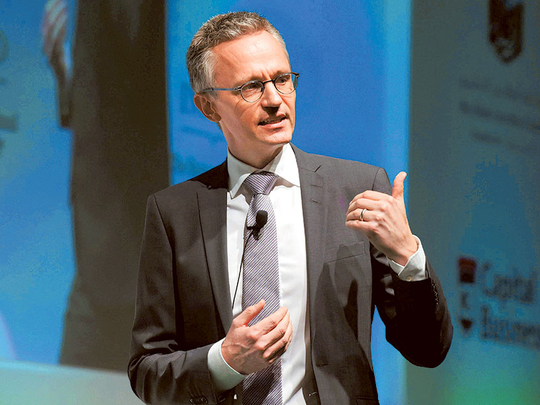
Abu Dhabi: Understanding millennials is key to knowing how to shape the work environment for the future, said a researcher.
A decade from now, millennials will constitute about 75 per cent of the global workforce, according to Dr Henrik Bresman, Associate Professor of Organisational Behaviour at INSEAD Business School, Abu Dhabi, and author of the report, Millennials: Understanding a Misunderstood Generation. Dr Bresman is also one of the lead reserchers on the subject.
The report explores the significance and importance of understanding this generation, specially in a work environment.
Millennials, often referred to as Generation Y, are people born between the early 1980s and early 2000s. This generation, which is thought to be very different from any other group, has been the focus of many studies in recent years.
Why should understanding the millennials matter?
Dr Bresman, who was giving a presentation at the INSEAD Global Business Leaders Conference in Abu Dhabi on October 20, breaks it down in simple terms. “Why is it important to understand millennials? We know that in about 10 years from now, millennials will constitute about 75 per cent of the entire workforce in this world.
“That means not long from now, any leadership position of consequence, in business, government or academia, will be occupied by a millennial,” said Dr Bresman. “So it is in our interest to understand what motivates them, demotivates them, what makes them tick.”
The INSEAD director’s research has identified a number of characteristics that can be associated with millennials but one that stood out more than others was their desire to be treated as individuals. “They would like to see an individualistic approach to their careers and to their leadership development.”
Dr Henrik often works with companies to advise them on how to treat millennial employees to get the best out of them and to develop their leadership skills. “The basic advice I can give is, you [employers] need to pay very good attention to what motivates them [the millennials], which might be very different from one person to another,” said Dr Bresman, during the presentation.
“[Millennials] do expect an individualised approach and if you can’t give it to them, and if they are good, they will have options and will go somewhere else,” he added.
Using one of his clients, an investment banking company as an example, Bresman clarifies his point. In this particular firm, he says, when employees wanted to climb the career ladder, their boss would tell them that if they worked hard and if they were lucky, in 10 years’ time, they could succeed. “That doesn’t work now. Today, you need to have a strategy,” he said.
According to Bresman, this approach will not work with millennials because they are motivated by different things. While one employee may be motivated by money, another may be motivated by something completely different, he said. “So you really need to know how to motivate each individual.”
The shift in approach has been significant, according to Dr Bresman. “The difference is interpersonal differences has never been so great. The risk of going wrong by treating everyone the same has gone up, particularly for the category of millennials [high achievers] whom you want to keep.”
Another piece of advice for employers who want to get the most of their millennial employees is to use them as mentors. “Reverse mentoring is an idea that has been around for a while. Some companies assign a millennial mentor for a senior leader and they will have structured meetings between the millennial employees and executive leaders to make sure they understand, on a personal level, what the differences are in how they see the world and how they work.”
Dr Bresman warns that employers who don’t take good care of their best millennials are most likely going to lose them. “Because they will have other options and the rest will be very unhappy. They [the unhappy millennials] will stay because they don’t have other options. But you won’t be able to utilise their potential.”
What makes millennials so different?
Dr Bresman points to the massive changes brought about by globalisation and the astonishing volume of information accessibility offered by internet as the major influencers.
“[Millennials] are the first generation who don’t predict based on what used to be. [For example], they know phones will not look like this five years from now. People like myself [from the older generation] tend to predict that I am going to use the same gadgets as I do now. So I might buy something and think this is what I am going to use from now on whereas millennials expect change. This is a tremendously important [trait] if you are in a fast-moving environment” which helps them better ride the waves of change. “They are better informed and if they don’t know something, they know where to find it.”
Millennial generation’s characteristics
1. Individuals who want their employers to work with them individually
2. Desirous of being in leadership positions
3. Future high earnings are important to them
4. Weigh work-life balance more than money and status
5. Want to be specialists rather than generalists
The INSEAD academic’s research surveyed 16,637 people between 18 and 30 years old in 43 countries across Asia, Africa, Europe, Latin America, the Middle East, and North America. Although the attributes associated with millennials are generally true overall the report found, they can slightly differ from region to region based on cultural influences and differences.
“It doesn’t make sense to treat Japanese, Swedish and Emirati millennials the same,” said Dr Bresman.












